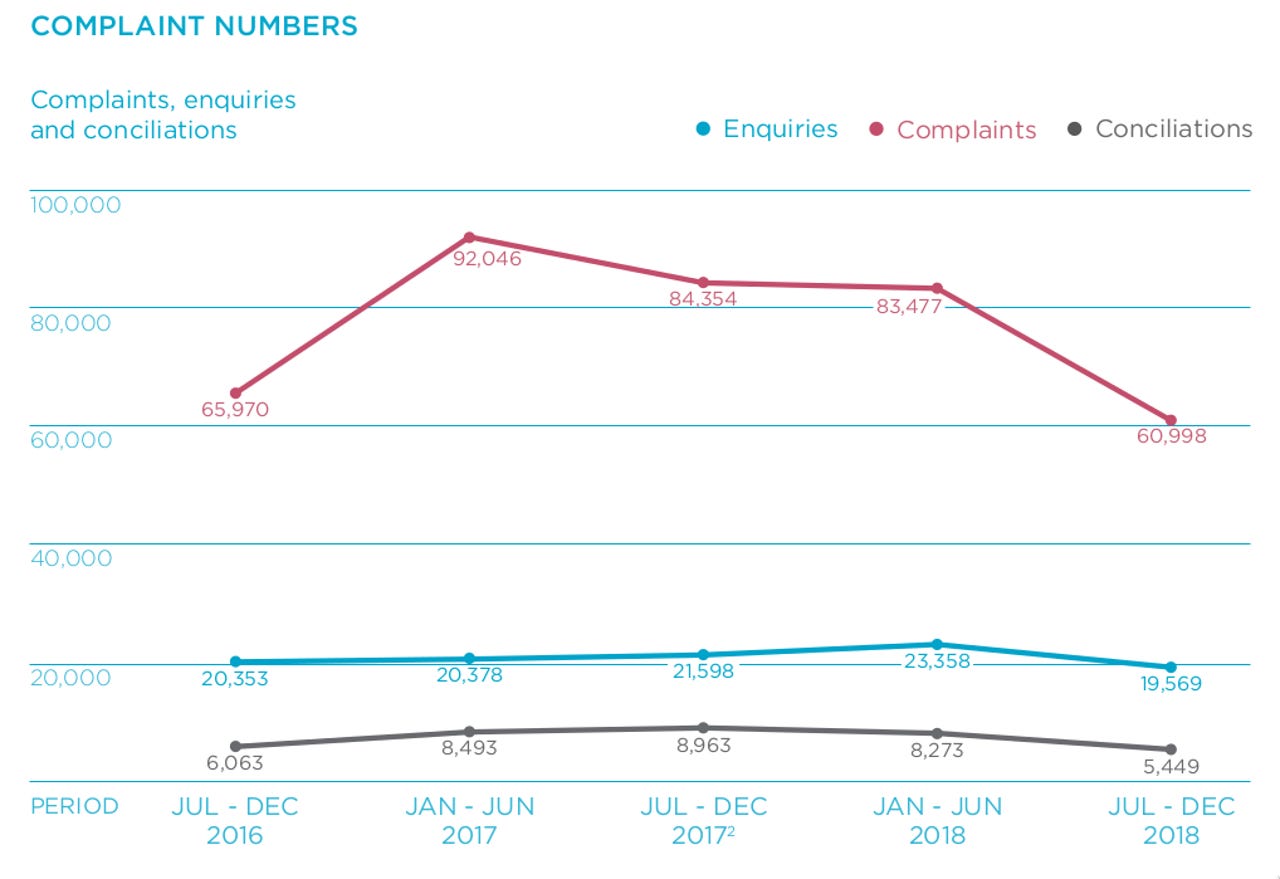Complaints to TIO over NBN service halved for six months to December 2018


Despite an added 1.3 million premises to the National Broadband Network (NBN) in the twelve months to December 31, the Telecommunications Industry Ombudsman (TIO) saw half the complaints it did in 2017.
According to the latest update from the TIO, it received just under 10,000 complaints on NBN services for the six months to December 31, 2018, compared to 14,000 for the same period a year prior. Divided by a thousand premises on the network, a metric of 4.1 was recorded for the last six months of 2017, and 2.1 was posted to December 2018.
The decline in complaints relating to connecting to or changing providers on the NBN was not as steep, with complaints per thousand premises added to the network falling from 9.2 to 6.7.
The TIO reported overall complaints from residential and small business customers sat just shy of 61,000, a 28% percent drop year-on-year.
"While the figures show complaint numbers at similar levels to the same six months in 2016, total complaints remain higher than in the same period in 2015," Ombudsman Judi Jones said.
"While I am pleased with the decrease, the report is a snapshot of a relatively short period in a complex story."
Around 85% of complaints were from residential consumers, which made up slightly less of the prior year's figure.
Leading the list for most complained issues to the TIO were: None or delayed action by service provider; disputed charges; no working phone or internet; delays with connections or switching providers; and intermittent service.
The decline in complaints were welcomed by the Australian Communications Consumer Action Network (ACCAN), which said consumers were benefiting from ACMA action and potentially its speed monitoring reports as well.
In August, ACMA could begin to directly enforce its NBN migration rules, with the ability to commence court proceedings to seek injunctions and civil penalties of up to AU$10 million.
"The ACMA is putting telcos on notice that they need to fully understand the new rules and take immediate steps to embed them in their business practices," ACMA Chair Nerida O'Loughlin said at the time.
"The ACMA has already commenced a targeted program of monitoring, audits, and investigations to ensure that industry is complying with the new rules."
The Communications Alliance also welcomed the decline in complaints throughout 2018.
"Industry recognises that there are still challenges to overcome and that we are still in the middle of an accelerating national network rollout -- with multiple partners in the supply chain -- that inevitably generates a degree of disruption and a level of customer complaints," Comms Alliance CEO John Stanton said.
"We look forward to the upcoming registration of the improved and strengthened Telecommunications Consumer Protections Code, as an additional tool to help generate further sustained improvements in customer experience. We also welcome the TIO's proposed transition to quarterly reporting as this will provide ongoing and timely information on issues that consumers may be experiencing."
On Tuesday, the Australian Labor Party took the wraps off its NBN policy to make best of what we have. In it, the ALP committed to directing the NBN to undertake free work to improve the in-home cabling of 750,000 fibre-to-the-node customers.
Shadow Communications Minister Michelle Rowland said there are realities with NBN that could not be undone, and the in-home cable upgrade to around 750,000 FttN premises would result in a AU$125 million jump to NBN's peak funding needs.